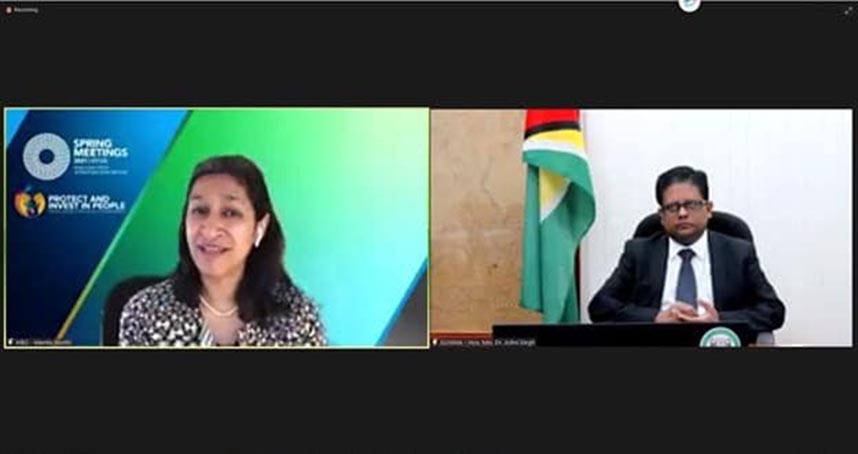Education projects will feature prominently in government’s upcoming collaborations with the World Bank, according to Finance Minister Dr Ashni Singh, who on Monday said it is part of heavy investment being made in the social sector in keeping with the prioritisation of initiatives to promote human capital development.
Addressing a Ministerial Conclave on Human Capital convened by the World Bank Group as part of the International Monetary Fund and World Bank Group’s 2021 Spring Meetings, which are currently being held virtually, Singh emphasised that the government views human capital development “as both a critical prerequisite for and a critical objective of economic growth”.
“…[D]espite the many competing calls on our finite fiscal resources, we are investing heavily in the social sector – education, health, etc. – as well as in facilitative infrastructure such as information and communications technology,” Singh was quoted as saying in a press release issued by his ministry.
“For example, in education, we are investing heavily in early childhood education, universal primary and secondary education, improving access to and quality of tertiary education, strengthening technical and vocational education, improving learning outcomes at all levels, and ensuring lifelong learning – supported with the use of information and communication technology based on lessons learnt during COVID-19 – and all with the aim of improving production and productivity as well as individual and household well-being,” he added.
Singh further said that on many of these initiatives, the government is collaborating with the World Bank “and we expect the education sector to dominate our portfolio of projects with the Bank in the next programming cycle… this will be in keeping with our emphasis on human capital development both as an input to, and an outcome of, sustainable economic growth.”
According to the release, Singh spoke on promoting economic opportunities while ensuring environmental and fiscal sustainability.
He noted Guyana’s economic prospects as a result of its natural resources, including oil, minerals, and forests, while saying that the outlook remains bright despite COVID-19 and domestic political issues that he blamed for a sharp contraction in non-oil GDP in 2020.
Even with the many challenges, he said, Guyana is still the fastest growing economy in the world as a result of its production of oil, and will remain amongst the fastest growing economies in the next few years. “But we also face extreme vulnerabilities to climate change, as well as significant development challenges. We are well aware of the magnitude of these challenges. They include avoiding the resource curse, promoting a strong and competitive non-oil economy, addressing our infrastructure gap, and improving human development outcomes,” he added.
Against this background, he mentioned that government is moving to launch its low carbon development agenda.
He noted that the country’s Low Carbon Development Strategy (LCDS), which would soon be expanded, is testimony to its commitment to low carbon or green growth.
“In 2008, we published what we believe was the first low carbon development strategy for a developing country. The LCDS reflected that Guyana is at the intersection of many different aspects of the climate challenge. On the one hand, our low-lying coast means we are heavily impacted by climate change,” he said, before highlighting examples of some of the impact on the country as a result of climate change.
Singh added that the LCDS paved the way for Guyana to join with Norway in 2009 in the world’s third largest international forest partnership under which the climate services provided by our forests were remunerated for the first time – making available US$250 million of performance-based
payment for climate services to finance climate-friendly investments.
The release said the Conclave was held under the theme ‘Investing in Human Capital for a Green, Resilient and Inclusive Recovery’ and saw participation from the World Bank Group President David Malpass, other senior executives of the Bank, as well as several Ministers of Finance from around the world.






